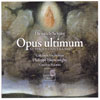Schütz Schwanengesang
Can this be the greatest work by an octogenarian before Strauss?
View record and artist detailsRecord and Artist Details
Composer or Director: Heinrich Schütz
Genre:
Vocal
Label: Harmonia Mundi
Magazine Review Date: 6/2007
Media Format: CD or Download
Media Runtime: 89
Mastering:
Stereo
DDD
Catalogue Number: HMC90 1895/6

Tracks:
| Composition | Artist Credit |
|---|---|
| Schwanengesang, 'Swan Song' |
Heinrich Schütz, Composer
Concerto Palatino Ghent Collegium Vocale Heinrich Schütz, Composer Philippe Herreweghe, Conductor |
Author: Jonathan Freeman-Attwood
Philippe Herreweghe’s return to the bosom of the 17th century is as welcome as his recent claims for an “authentic” approach to Bruckner symphonies have, generally speaking, not been. Indeed, the beauty of this remarkable performance of Schütz’s last work resides principally in Collegium Vocale’s blooming cradle of sound and how it unassumingly stakes its claim – with no subtext – on the unique ambitions of Schütz’s “Swansong”. These are founded on the composer’s distilled and often austere contemplation of Psalm 119 in 11 double-choir motets, joined by Psalm 150 and the impressive Deutsches Magnificat.
If not texturally pared down, this is a journey where the 86-year-old Schütz withdraws from the world in a lexicon of finely drawn plainchants, antique modes, taut contrapuntal and antiphonal exchanges, melodic swathes and quicksilver declamations. Herreweghe illuminates each verse with a considered and gentle ear for the progression from the “statutes” of faith towards a sense of hope and salvation as we move towards a new Covenant, revealed in the final motet with its assuaging supplications and rock-like assurance. Here we sense, above all, Schütz’s mix of defiance and resignation for the gradual passing of a self-contained sacred tradition threatened by radical worldly things (like operas).
Collegium Vocale relish Schütz’s introspection and easy exchange between solo and tutti sections, which allow the inspired rhetorical mood-changes to reveal each marked-out image (“when thou shalt enlarge my heart” at the end in the second motet is dealt a moment of special attention as it moves towards a conclusion in rapt homage to Monteverdi). Herreweghe’s performances are generally outstanding in their attention to detail: some might quibble that the inner tutti voices occasionally lack focus and energy, but this is a performance where Schütz’s seasoned harmonic shifts are treated as pure music and not over-accentuated by rhetorical zeal: the music doesn’t need it.
In any case, the doubling of the two four-part choirs with brass gives Herreweghe scope for a variety and scale which ensures that graphic representation emerges from a palette of irradiating luxuriance. The sixth motet is a masterpiece of interchanging images and yet a chance for Herreweghe to judge, exquisitely, Schütz’s own contemplative paraphrases (here, from a madrigalian “quicken me after thy loving kindness” towards a growth of soaring affirmation for “thy word is settled in heaven”).
That we have these works at all is a minor miracle. Schütz’s Opus ultimum was discovered in 1900 and then assumed destroyed in the Second World War, before reappearing in the mid-1970s. Can a greater work have been completed by an octogenarian? This recording urges us, very persuasively, to think perhaps not.
If not texturally pared down, this is a journey where the 86-year-old Schütz withdraws from the world in a lexicon of finely drawn plainchants, antique modes, taut contrapuntal and antiphonal exchanges, melodic swathes and quicksilver declamations. Herreweghe illuminates each verse with a considered and gentle ear for the progression from the “statutes” of faith towards a sense of hope and salvation as we move towards a new Covenant, revealed in the final motet with its assuaging supplications and rock-like assurance. Here we sense, above all, Schütz’s mix of defiance and resignation for the gradual passing of a self-contained sacred tradition threatened by radical worldly things (like operas).
Collegium Vocale relish Schütz’s introspection and easy exchange between solo and tutti sections, which allow the inspired rhetorical mood-changes to reveal each marked-out image (“when thou shalt enlarge my heart” at the end in the second motet is dealt a moment of special attention as it moves towards a conclusion in rapt homage to Monteverdi). Herreweghe’s performances are generally outstanding in their attention to detail: some might quibble that the inner tutti voices occasionally lack focus and energy, but this is a performance where Schütz’s seasoned harmonic shifts are treated as pure music and not over-accentuated by rhetorical zeal: the music doesn’t need it.
In any case, the doubling of the two four-part choirs with brass gives Herreweghe scope for a variety and scale which ensures that graphic representation emerges from a palette of irradiating luxuriance. The sixth motet is a masterpiece of interchanging images and yet a chance for Herreweghe to judge, exquisitely, Schütz’s own contemplative paraphrases (here, from a madrigalian “quicken me after thy loving kindness” towards a growth of soaring affirmation for “thy word is settled in heaven”).
That we have these works at all is a minor miracle. Schütz’s Opus ultimum was discovered in 1900 and then assumed destroyed in the Second World War, before reappearing in the mid-1970s. Can a greater work have been completed by an octogenarian? This recording urges us, very persuasively, to think perhaps not.
Discover the world's largest classical music catalogue with Presto Music.

Gramophone Digital Club
- Digital Edition
- Digital Archive
- Reviews Database
- Full website access
From £8.75 / month
Subscribe
Gramophone Full Club
- Print Edition
- Digital Edition
- Digital Archive
- Reviews Database
- Full website access
From £11.00 / month
Subscribe
If you are a library, university or other organisation that would be interested in an institutional subscription to Gramophone please click here for further information.




